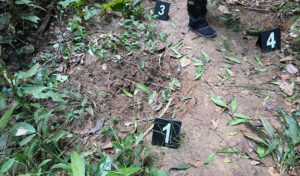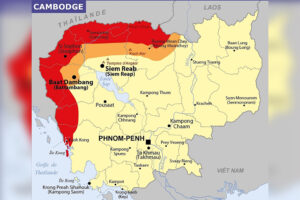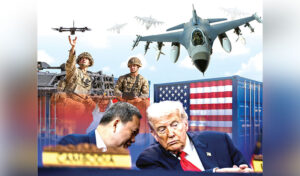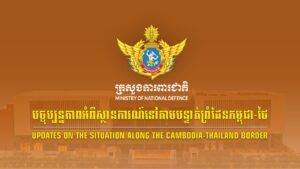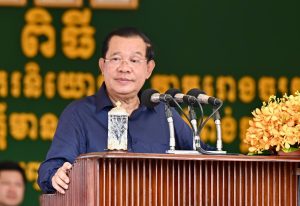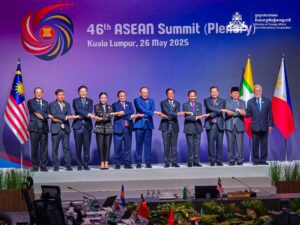Opinion: The Ball Is in Thailand’s Court: Cambodia Has Made Its Position Clear
Lam Chea, Minister in charge of the State Secretariat of Border Affairs, shakes hands with Prasas Prasasvinitchai, Advisor to the Thai Ministry of Foreign Affairs in charge of border affairs, during a June JBC meeting. Supplied
The Phnom Penh Post | Thailand’s claim that it is earnestly seeking dialogue while Cambodia delays progress on border negotiations is not only misleading — it is a deliberate distortion of the truth. A July 17 article in The Nation portrayed Thailand as the responsible actor pursuing diplomacy through the JBC, GBC and RBC mechanisms, while painting Cambodia as the holdout. This narrative, however, collapses under scrutiny.
Cambodia Is Not the Obstacle—Thailand Is
The truth is simple: Cambodia has already set a clear and reasonable roadmap for restoring normalcy. Prime Minister Hun Manet, in both public statements and diplomatic communications, laid out three conditions for reopening and reengagement — conditions based not on confrontation, but on mutual respect and reciprocal action. Cambodia is ready to respond. But it is Thailand that must take the first real step.
Three Conditions, One Principle: Respect
Cambodia’s position is grounded in facts, fairness and a commitment to peaceful relations. The closure of the border was initiated unilaterally by Thailand on June 7; therefore, any reopening must begin on the Thai side. As Hun Manet emphasised, “The key is already in Thailand’s hands — just unlock it and restore the situation to how it was before June 7, 2025. There’s no need for further talks or concessions.”
Cambodia’s Three Conditions for Reopening the Border are: 1. Thailand must unilaterally reopen the border and guarantee it will not close it again unilaterally. 2. All official border checkpoints must be reopened, without exception. 3. Border operations must return to the pre-June 7 schedule of 6am to 10pm. These conditions are not demands. They are expressions of responsibility and fairness — designed to protect both countries’ interests and uphold the dignity of border communities.
Who’s Holding Up Peace?
Thailand’s invocation of JBC, GBC and RBC meetings is nothing more than a diplomatic smokescreen. In practice, it is Thailand’s Second Army Region that has repeatedly acted unilaterally, escalating tensions on the ground through aggressive movements, trench digging and military infrastructure in disputed areas.
The May 28 skirmish in Ubon Ratchathani did not occur in isolation. It was the direct result of Thai troops violating contested ground. To now suggest that Cambodia’s response has hindered negotiations is not only hypocritical — it is an intentional misrepresentation of events.
Likewise, The Nation’s portrayal of the incident involving a former Thai ranger who assaulted a Cambodian border soldier as merely a “tourist altercation” is an insult to the truth. This was a violent provocation, followed by a media campaign to paint Cambodia as the aggressor, while Thailand continued to tighten border access and deny responsibility.
Cambodian Restraint Reflects Strength, Not Submission
Throughout this ordeal, Cambodia has shown restraint — not out of weakness, but out of responsibility. The leadership of Senate president Hun Sen and Prime Minister Hun Manet has prioritised peace, national dignity and long-term regional stability. That is why Cambodia has not closed the door to talks — only insisted that talks be held under equal and honest conditions.
Cambodia will not be baited into one-sided meetings while Thai forces remain entrenched in sensitive areas and gates remain locked from the Thai side.
Open All Gates, or Stop Pretending
If Thailand truly wants peace, it must first reopen all border gates it closed prior to 7 June. That is the starting point — not a favour to Cambodia, but a correction of its own actions.
The ball is — and has always been — in Thailand’s court.
Until Thailand stops the double game of provocation on the ground and posturing in the media, no amount of invitations to formal meetings will move the process forward. Cambodia will not be pressured into submission or blamed for delay when it is Thailand that must show sincerity and accountability.
The international community, ASEAN observers, and regional partners must not be misled by Thailand’s shallow diplomatic theatrics. The solution is simple: Cambodia has made its position clear. Thailand must first unilaterally reopen the border gates — just as it unilaterally closed them on June 7 — before any meaningful discussions on mechanisms like the JBC, GBC or RBC can proceed.
Roth Santepheap is a geopolitical analyst based in Phnom Penh. The views and opinions expressed are his own.


